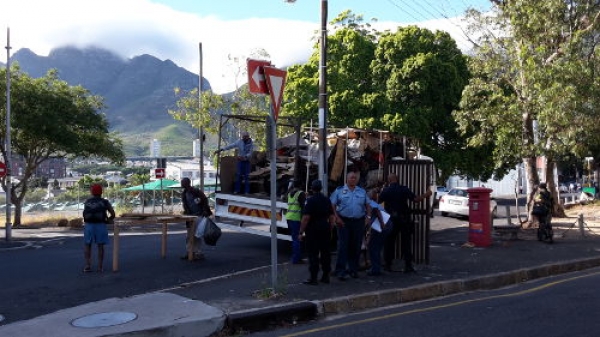Hope Street carpenter evicted, again

Hope Street’s pavement carpenter Mark Philander again had his material confiscated by officers from the City of Cape Town Law Enforcement this morning. Now, a local councillor has committed to linking Philander to the City’s informal traders unit in an attempt to find a public space for him to work legally and unhindered.
Every time Philander is evicted from his pavement workshop near parliament, he returns and rebuilds his business from scratch – converting a pallet of scrap wood into a piece of furniture to sell for profit.
Last month, following an eviction, GroundUp relayed Philander’s life story and continued defiance of Law Enforcement officers who regularly confiscate his wares.
“Nowadays they can’t break my spirits anymore. I’ll be back. I’m here, in Hope Street, to stay,” he said.
Mayco member for Safety and Security, JP Smith, said last month that Philander was contravening a bylaw which regulated public space, and that evictions were inevitable.
But local councillor Dave Bryant, who once headed up the City’s informal traders unit, said that there is hope for Philander to find a City designated work space. Today Bryant told GroundUp that he would visit the site of Philander’s informal workshop and link the carpenter with staff at the informal trader’s unit. That unit is in the process of updating a plan for the City’s informal traders for the first time in 18 years.
The City has become more “pedestrianised”, and the new plan will see the congestion of traders’ areas like Adderley Street be alleviated by making more designated spots available. The hope is that a relocation of established traders to places like Bree Street and Government Avenue in Company Gardens will link traders with new customers and “economic opportunity”, Bryant said.
Although Philander is unlikely to immediately stand to benefit from a new plan – which will be focussed on acommodating licensed and establish CBD traders – he can apply for a trading permit at the Civic Centre, and be alocated a new bay once other traders have been relocated.
“An alternative would be to reach out to private sector players in the Lower Gardens area,” Bryant said, adding that there were a number of carpenters in the neighbourhood and that some of them may be willing to assist Philander with a work space.
Bryant complimented Philander’s work and said that it would be in the interest of the City’s economic development mandate to facilitate a process whereby Philander can continue his work without being removed or delinked from his customer base in Gardens. He committed to reporting back to GroundUp once he had spoken with Philander and staff at the informal trader’s unit.
Next: Cartoons and the Prophet Muhammad
Previous: From hiking to praying: Deer Park’s diversity in photos

This article is licensed under a Creative Commons Attribution-NoDerivatives 4.0 International License.


